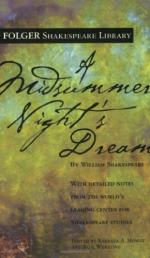|
This section contains 4,160 words (approx. 14 pages at 300 words per page) |

|
SOURCE: Rhoads, Diana Akers. “A Midsummer Night's Dream: Shakespeare's Dramatic Solution to the Problems Poetry Poses for Politics.” In Shakespeare's Defense of Poetry: A Midsummer Night's Dream and The Tempest, pp. 49-60. Lanham, Md.: University Press of America, Inc., 1985.
In the following essay, Rhoads contends that in A Midsummer Night's Dream Shakespeare portrayed Theseus as both an ideal ruler and a ruler who lacks the ability to understand love in order to highlight the incompatibility of “desire and politics.”
There are basically two critical attitudes towards Theseus. One sees him as a representative of reason and of rational love as opposed to the madness and irrational love of the other Athenian lovers. His love becomes the norm or the social ideal.1 Critics who espouse this attitude often refer to Theseus as the ideal ruler, and they give him the attitudes of the Theseus of Chaucer's Knight's Tale.2 Like...
|
This section contains 4,160 words (approx. 14 pages at 300 words per page) |

|


